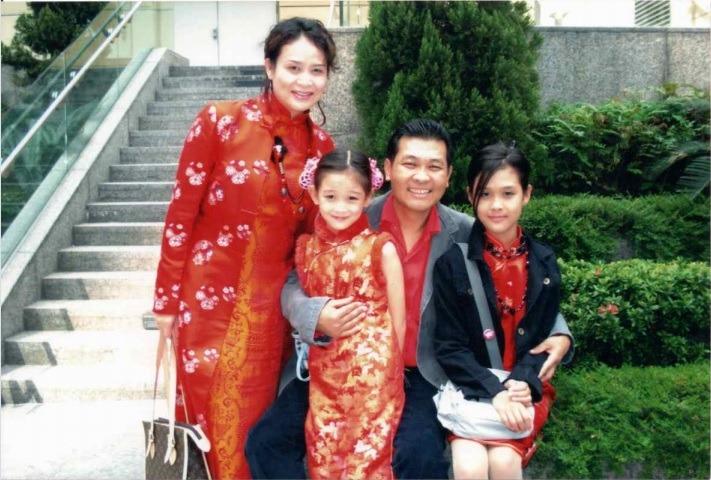 This undated file photo shows restaurant owner In Gurung and his family. (PHOTO PROVIDED TO CHINA DAILY)
This undated file photo shows restaurant owner In Gurung and his family. (PHOTO PROVIDED TO CHINA DAILY)
Instead of the usual hustle and bustle at Sole Mio – a popular Italian restaurant located in the heart of Soho, one of the busiest nightspots in Hong Kong’s Central District -- only police officers come knocking on its door regularly at nightfall as part of the city’s stringent pandemic control regulations.
In Gurung, who runs the eatery and watering hole, still insists on opening the restaurant six days a week and has faith in his business despite dwindling revenues each month as diners confine themselves at home.
Restaurant owners are clamoring for new channels to cut costs and create more revenue through advertisements. They’ve turned to online platforms, such as Instagram and WeChat, to get more business
Hong Kong’s current outlook diffusion index for restaurants was down 0.3 points in February month-on-month -- still below the neutral threshold -- according to the Census and Statistics Department. Restaurant owners are clamoring for new channels to cut costs and create more revenue through advertisements. They’ve turned to online platforms, such as Instagram and WeChat, to get more business.
Warm orange lights, interspersed with customers’ laughter, the incessant clinking of wine and beer glasses, as well as redolent music, used to dictate the rhythm at Sole Mio throughout the day. But, in deep contrast, silence now looms over the entire premises as the clock clicks past 2 pm. But Hong Kong’s “Below the Lion Rock’ spirit remains very much alive in In Gurung.
He said he believes the good old days will be back soon, with his relentless efforts through media marketing and the government’s iron-clad resolve to bring the pandemic under control.
ALSO READ: Lam welcomes arrival of another 300 mainland medical workers
To stamp out surging COVID-19 infections during the current fifth wave, the Hong Kong Special Administrative Region has enforced some of the toughest social distancing rules since February, such as banning members of more than two households from gathering even in private premises.
Other measures, including capping the number of customers at two at each restaurant table, banning dine-in services after 6pm, and requiring the COVID-19 vaccine pass for admission to catering businesses, have been in effect since early January.
Initially, In Gurung bore grudges against the government’s strict anti-pandemic measures, but later agreed that they are necessary as such regulations could bring back customers quickly. But he also observes that the longer the pandemic lasts, the more customers’ eating habits will change.
“I’ve noticed that people tend to eat faster at the table and more customers now prefer takeaways,” he said. “It would take time for the catering sector to adapt to the change, and getting diners to return soon is paramount.”
ALSO READ: HK eyes rent moratorium law for beleaguered SMEs
Running a restaurant isn’t just a way of making a living. It’s a career In Gurung loves and is willing to dedicate his whole life to nourish. “It has been my dream to operate my own restaurants since childhood,” he said.
Hailing from Nepal, the 57-year-old restaurateur came to Hong Kong in 1990 in search of greener pastures. Armed with the experience of having managed Italian eateries in Lan Kwai Fong Group, he founded his first restaurant Sole Mio in 1999.
In Gurung said he never thought that he would stay in Hong Kong for several decades. The city’s business-friendly environment is a big plus for him and he decided to have a family here, raising two daughters.
Hong Kong is renowned for its low and simple tax system, efficient government, freedom of movement for capital and highly-skilled workforce. “These advantages have hardly changed in the past three decades, and I believe they’ll not change with the continued support of the Chinese mainland,” said In Gurung.
According to the UNCTAD World Investment Report 2021, foreign direct investments in Hong Kong reached $119.2 billion in 2020, ranking third globally.
READ MORE: HK govt proposes new $3.34b Anti-epidemic Fund aid
The HKSAR government has started a Catering Business Subsidy Scheme to provide one-off subsidies to catering businesses hard hit by the pandemic. Restaurants, karaoke establishments, nightclubs, bars and pubs are eligible for the sixth round of the latest $27-billion Anti-epidemic Fund.
But In Gurung said the amount of cash he has received is not enough to cover even a month’s rent at his eatery although the landlord has brought it down. “To keep my restaurant going, I’ve been paying at least 30 percent more with my own funds since July last year to balance operating costs.”
Sole Mio, which has been in business for 23 years, is among just a few restaurants in Soho that have managed to keep their heads above water amid the pandemic. “COVID-19 is even worse than SARS,” said In Gurung. “People’s confidence in business returned quickly as SARS had lasted merely three to four months.”
The Hong Kong Federation of Restaurants and Related Trades said more than 1,200 restaurants have suspended operations, while 300 have shut down permanently.
“I’ve chosen to keep this restaurant open for tomorrow,” said In Gurung. “I believe customers will return.”
tianyuanzhang@chinadailyhk.com


